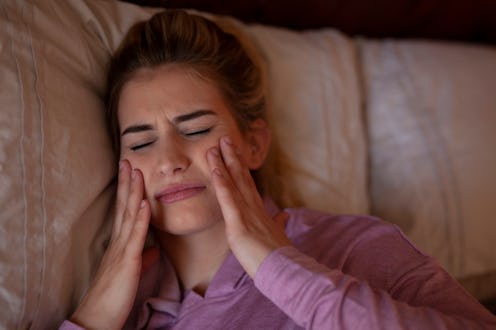Wellness
7 Genius TikTok Hacks To Put A Stop To Your Teeth-Grinding Habit
Rise without the grind.

There's nothing worse than waking up in the morning with a headache, stiff jaw, or sensitive teeth when all you wanted was to rise feeling refreshed. The culprit for these morning pains might be bruxism, a common condition where you clench or grate your teeth while you sleep. If you're looking to stop this nighttime habit or your mouth guard isn't cutting it, there are a number of TikTok hacks for how to stop grinding your teeth worth trying.
According to research, teeth grinding can be triggered by stress, anxiety, or problems with sleep, and can result in headaches, a sore jaw, ear aches, and tooth pain. It's estimated that 13% of adults grind their teeth at night, so you're not alone if you experience the annoying condition. Besides being uncomfortable, bruxism can also affect you in the long run by chronically disrupting your sleep, flattening or chipping your teeth, and wearing down tooth enamel, which exposes you to tooth decay and cavities.
Though you should consult your dentist if you have a serious case of bruxism, there are some hacks that help ease sleepy-time teeth grating. Where better to turn for tips and tricks than the app you're probably scrolling through right before hitting the hay? Check out these TikTok hacks to stop tooth grinding so you can wake up refreshed and jaw pain-free.
1Exercise, Exercise, Exercise
While it might not seem like your daytime workout routine influences your nighttime teeth grinding, this TikTok says otherwise. Working out can drain your body of energy that you might otherwise use to grind your chompers. As an added bonus, exercise can relieve stress and help you get better sleep, all of which could further tackle underlying causes of your grinding habit.
2Get A Personal Trainer... For Your Jaw
Difficulty relaxing your facial muscles can lead to grinding or clenching your teeth. And while your dentist may be your first phone call, this TikTok recommends enlisting other health professionals in your quest to conquer bruxism: Physical therapists can help align and strengthen jaw muscles to mitigate teeth grinding through massage and face-stretching exercises. A chiropractor can also correct joint or muscle issues in other parts of the body that contribute to tension in your jaw.
3Give Yourself A Massage
A massage is always an appealing solution, whatever your dilemma may be. This TikTok recommends kneading and stretching your facial muscles, which can help align your jaw and release tension that contributes to clenching or grinding. You can with a physical therapist or try a self-massage at home to set your jaw up for sleepytime success.
4Find Your Pressure Points
Acupressure, a Traditional Chinese Medicine practice that touches localized points for various healing purposes, can help relieve jaw pain and reduce bruxism, according to this TikTok. Applying pressure to certain spots in the muscles connected to your jaw can help ease inflammation from muscle tension so that your mouth is able to relax in time for bed.
5Address Your Stress
Ever notice how your jaw tenses up whenever you're anxious? That can still happen overnight, because stress lives in your body and can manifest as teeth grinding, according to this TikTok. Try a meditation or gentle yoga flow before bed to relax your body and mind, or work with a therapist to alleviate your anxieties in the longer term. Your mental health and your teeth will thank you.
6Skip The Gum
While a stick of gum can do wonders for morning breath, it might not be worth it if you're waking up with jaw pain. Repetitively clenching and unclenching your jaw while chewing gum can prime your muscles for nighttime tension and grinding. This TikTok recommends avoiding gum (and other hard or chewy foods) so that your muscles learn to relax, day and night.
7Practice Good Posture
While your WFH setup might not lend itself to perfect posture, taking the time to align your spine and neck muscles could make all the difference come nighttime, says this TikToker. When you're sitting up straight, there are natural curves to your spine that allow your skeleton to hold your head up. But looking down at a screen all day means your neck muscles, not your bones, are doing most of the heavy lifting. This can strain the muscles supporting your head and lead to tension in your jaw. Try hanging your head back throughout the day so that your muscles are relaxed once your head hits the pillow.
Studies referenced:
Demjaha, G. (2019). Bruxism Unconscious Oral Habit in Everyday Life. Open Access Maced J Med Sci. https://www.ncbi.nlm.nih.gov/pmc/articles/PMC6447347/
Manfredini, D. (2009). Role of psychosocial factors in the etiology of bruxism. Journal of Orofacial Pain. https://pubmed.ncbi.nlm.nih.gov/19492540/
Manfredini, D. (2013). Epidemiology of bruxism in adults: a systematic review of the literature. Journal of Orofacial Pain. https://pubmed.ncbi.nlm.nih.gov/23630682/
Shetty, S. (2010). Bruxism: A Literature Review. The Journal of Indian Prosthodontic Society. https://www.ncbi.nlm.nih.gov/pmc/articles/PMC3081266/
Shokry, S.M. (2016). Association between Self-Reported Bruxism and Sleeping Patterns among Dental Students in Saudi Arabia: A Cross-Sectional Study. International Journal of Dentistry. https://www.ncbi.nlm.nih.gov/pmc/articles/PMC4789476/
This article was originally published on